Meek's Cutoff Blu-ray Movie
HomeMeek's Cutoff Blu-ray Movie 
Blu-ray + DVDOscilloscope Pictures | 2010 | 103 min | Rated PG | Sep 13, 2011
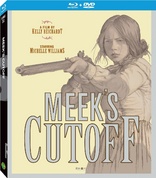
Movie rating
7 | / 10 |
Blu-ray rating
| Users | 2.5 | |
| Reviewer | 4.0 | |
| Overall | 3.9 |
Overview
Meek's Cutoff (2010)
The year is 1845, the earliest days of the Oregon Trail, and a wagon team of three families has hired the mountain man Stephen Meek to guide them over the Cascade Mountains. Claiming to know a short cut, Meek leads the group on an unmarked path across the high plain desert, only to become lost in the dry rock and sage. Over the coming days, the emigrants must face the scourges of hunger, thirst and their own lack of faith in each other's instincts for survival. When a Native American wanderer crosses their path, the emigrants are torn between their trust in a guide who has proven himself unreliable and a man who has always been seen as the natural enemy.
Starring: Michelle Williams, Bruce Greenwood, Paul Dano, Will Patton, Zoe KazanDirector: Kelly Reichardt
| Drama | 100% |
| Western | 21% |
Specifications
Video
Video codec: MPEG-4 AVC
Video resolution: 1080p
Aspect ratio: 1.33:1
Original aspect ratio: 1.37:1
Audio
English: DTS-HD Master Audio 5.1
English: LPCM 2.0
Subtitles
English SDH
Discs
50GB Blu-ray Disc
Two-disc set (1 BD, 1 DVD)
DVD copy
Packaging
Slipcover in original pressing
Playback
Region A, B (C untested)
Review
Rating summary
| Movie | 4.5 | |
| Video | 4.5 | |
| Audio | 4.5 | |
| Extras | 1.0 | |
| Overall | 4.0 |
Meek's Cutoff Blu-ray Movie Review
Kelly Reichardt’s minimalist western is neither meek nor mild.
Reviewed by Casey Broadwater September 26, 2011Last year, with my wife in the passenger seat and our cat in a carrier perched on a stack of boxes in the back, I drove from western Maryland to Seattle in four days, which averages out to about 675 miles per day. The greatest inconvenience we experienced—besides the cat’s incessant meowing, which we eventually remedied by drugging her up with Benadryl—was getting stuck in Laramie, Wyoming, when a snowstorm temporarily shut down the highway heading west. We pulled into the only place that seemed to be open, a kind of mom-and-pop taxidermy museum/leatherworks shop, where we spent the next four hours chatting up the friendly owners, reading, and browsing the internet on our laptops while the cat kept warm on a graciously donated piece of sheepskin. The snow cleared, we grabbed a Thai lunch, and we were in Boise by nightfall. Some hardship. We never had to ford a river or scavenge for food. We didn’t have to worry about getting attacked by a hostile tribe or running out of water. No one died of dysentery or contracted cholera. The wild, wild west has been thoroughly tamed, crisscrossed with freeways and dotted with hotels and convenience stores.
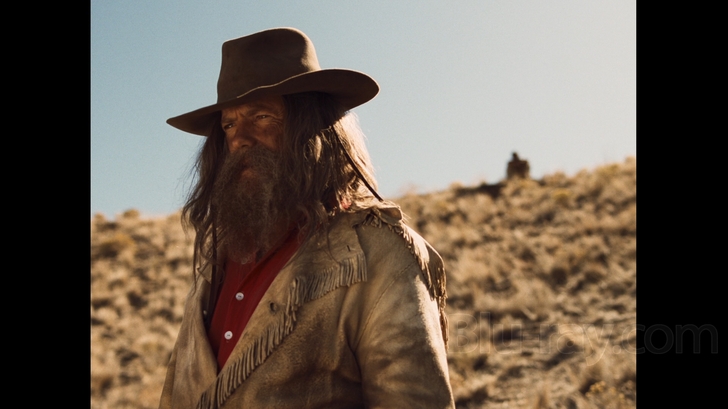
Meek, cutoff.
In comparison, the three families heading westward in Meek’s Cutoff have it almost unfathomably rough. It’s 1845, their mode of transport is covered wagons pulled by sickly-looking steer, and they’re lucky if they make it ten miles on any given day. There are no conveniences, no assurances of making it to their destination, or even of surviving at all. At its most literal, the film is a reminder of how hard life was for America’s pioneers. Meek’s Cutoff was directed by indie minimalist Kelly Reichardt, whose previous two features, Wendy and Lucy and Old Joy, are also road movie travelogues of a sort, the former about a woman whose car breaks down in Oregon on her way to Alaska, and the latter about two old friends who find themselves while trying to find an elusive hot spring in the Cascades.
Reichardt returns to the Pacific Northwest here—the film is set in the High Desert of eastern Oregon, the final stretch of the Oregon Trail—but takes us back 160-some years, to an era when the concern for sheer survival left little time for psychological introspection. Meek’s Cutoff might loosely be called a “western,” but only in the sense that it takes place in the old west. Otherwise, it’s not at all what you’d expect from a genre known for gunslingers, Indian ambushes, and moral certitude. The easiest way I can think to describe it is as an arthouse survival story with a subtext about American imperialism, a feminist undertone of male-pattern cluelessness, and a scope and pacing that suggest the rhythms and intimate grandeur of biblical fable.
In fact, the first words we clearly hear spoken in the film are from a young boy reading aloud the Genesis story of Adam and Eve’s banishment from the garden, and the bit about man being cursed to toil over the land for his food seems immediately apropos considering the utter barrenness surrounding these travelers, who are heading for what they hope will be “a regular second Eden.” The boy is the son of William and Glory White (Neal Huff and Shirley Henderson), a faithful couple hoping to find financial redemption in the western territories. They’re joined by Thomas Gately (Paul Dano) and his flighty wife, Millie (Zoe Kazan)—whose naiveté about the hardships ahead is suggested in the fact that she brings along a tiny songbird in a dainty cage—as well as widower Solomon Tetherow (Will Patton) and his new bride Emily (Michelle Williams), who talk in hushed tones about the intentions of Stephen Meek (Bruce Greenwood), their hired guide. Meek is a bearded and stringy-haired mountain-man who tells tale tales and claims to have been roving these lands for the past twenty years. His abilities as a guide, however, seem increasingly suspect. What he promised was a short cut has become a directionless slog through the desert wilderness. We know everything we need to know when we see Mr. Gately with a knife, scrawling the word “LOST” onto a sun-bleached fallen tree trunk. The water supply is dwindling. The steer are growing tired. The families begin leaving behind unneeded supplies to lighten the load.
The film is largely quiet and experiential, as Reichardt dwells on the harsh realities of such a journey: the tedium of trudging all day under the hot sun, the bickering between the men over which way to go—the women watch stoically from a distance as all the key decisions are being sussed out by their ineffectual husbands—and the desperate hope for water over the next hill. Reichardt’s editing is simple, with a preponderance for shots that last a minute or more, and there are few close-ups. Instead, with wide angles we see the characters in the context of their stunning but bleak surroundings. At the same time, the director has made a deliberate choice to shoot the film in the old Academy 1.37:1 aspect ratio, a roughly square frame that’s a stark contrast to the widescreen Technicolor 2.35:1 vistas we’ve come to expect from westerns. It has the effect of boxing in the characters, caging them like Millie’s bird. They’re in the middle of an endlessly wide-open landscape, but they’re constrained. Reichhardt has stated that the constricted framing is essentially a mirroring of the way women of that time period would see the world through their narrow sun-bonnets, their peripheral vision completely removed. It also seems to echo the “eye on the prize” tunnel-vision mentality of Manifest Destiny, the belief that westward expansion was a God-given mandate to America. Anything that lay in the periphery—the Native Americans, say, or the environment—was ignored.
The film’s dramatic crux comes when the pioneers capture a Cayuse Indian (Rod Rondeaux) who’s been following them. They face a dilemma; do they kill him immediately—as Meek nearly jumps to suggest—or do they try to barter with him and have him lead them to water? Can they put their faith in someone they’ve been pre-programmed to fear and hate? Michelle Williams’ Emily, who is perhaps the closest the film comes to a “lead” character, opts to trust him, as it becomes clear that Meek is leading them nowhere. But no one gets all Dances with Wolves buddy- buddy with the captive, with whom communication is practically impossible thanks to an unbridgeable language and culture gap. He’s merely their begrudging hope-of-last-resort. When Emily darns his falling-apart moccasin, she does so not out of kindness, but because, as she puts it, “I want him to owe me something.” She’s a strong character—clear-eyed and decisive when the men are either falsely optimistic, like her husband, or full of Grade-A bullshit, like Meek—and Williams’ plays her with a steely-gazed subtlety.
Unavoidably, Meek’s Cutoff will be deemed boring by those who expect a traditional western—there are no shootouts, hold-ups, or heists here—but for more patient viewers, the tumbleweed pace will nurture contemplation about the hardships of the old west, the place of women in American expansionism, and the mistreatment of the natives who were here long before wagons ever rolled across the plains. While the film stretches too far in its final scene for an ending that’s ambiguous and philosophically loaded, what comes before is striking in its solemn realism.
Meek's Cutoff Blu-ray Movie, Video Quality 
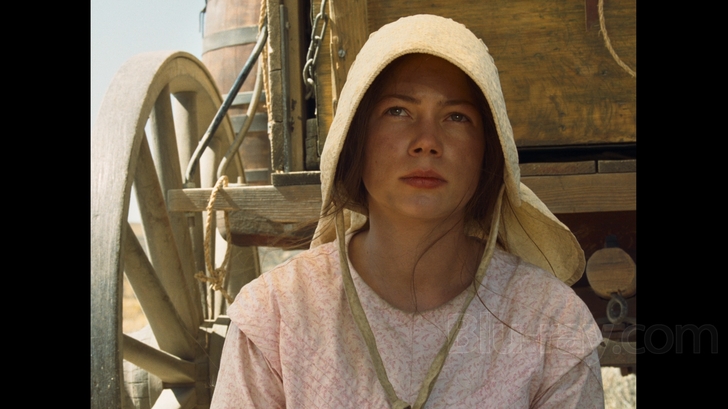
The most immediately striking thing about Meek's Cutoff's 1080p/AVC-encoded transfer, of course, is the fact that the film was shot in the 1.37:1 Academy ratio, which is rarely used for movies nowadays. (Fish Tank is another contemporary example, which also uses the nearly square ratio to suggest confinement.) While this gives the film a slightly old-fashioned quality, everything else about the picture is thoroughly modern, and exemplary in both color and clarity. Chris Blauvelt's cinematography is simply gorgeous, rendering the landscape with a keen attention to lighting and mood. You'll notice some scenes at night that are exceptionally dark—so dark it's hard to make out anything but the puny light coming off an oil lantern—but from what I've read this is intentional, reflecting the reality of the absolute blackness out on the desert plains. Color is rich and natural, with creamy highlights and tight contrast, and the amount of detail visible in the image is impressive, showing off the textures of frocks and wool blankets, suede Indian garb and the characters' increasingly weathered faces. Grain is fine and untouched by noise reduction, and there are no apparent traces of edge enhancement or any other forms of digital boosting. It's simply not necessary when you have a source image this refined. Likewise, there are no overt compression problems or encode quirks. The film looks wonderful.
Meek's Cutoff Blu-ray Movie, Audio Quality 

Meek's Cutoff is a great example of a film that doesn't need explosions or shootouts or car chases to have great sound design. The film's DTS-HD Master Audio 5.1 surround track is a non-stop reproduction of the sounds of the natural world. In the first scene, a stream babbles all around us, as if we're sitting right in the middle of it, and this sense of immersion continues throughout, from the constant hum of insects and the crackle of fire to the hush of wind blowing over the desert. It sounds wonderful—all of it—rich, crisp, and detailed. I also really enjoyed the film's appropriately minimalist soundtrack, which consists of rising, vaguely electronic droning. It's almost pure tone, and it suits the story's isolation and unease perfectly. Even more interesting is the way that Reichardt intentionally makes some voices hard to understand, like when the women sit from a distance, trying to listen in on the men's decision-making process. Of course, it's not always like this; most of the time the dialogue is clear and well-balanced. The disc includes a Linear PCM 2.0 fold-down, as well as optional English SDH subtitles.
Meek's Cutoff Blu-ray Movie, Special Features and Extras 
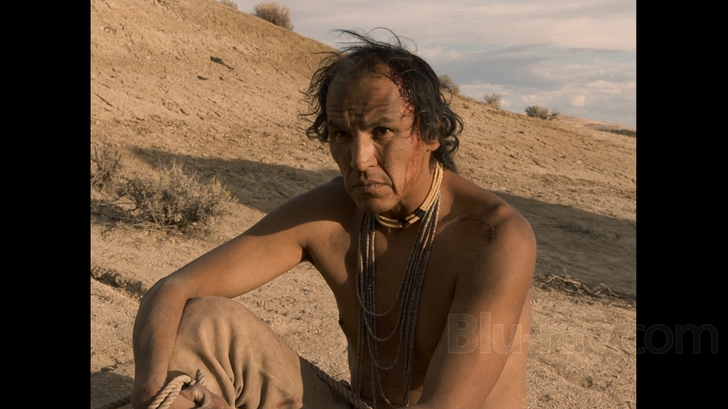
The only extras on the disc are a making-of featurette (1080i, 9:37), which is strictly a montage of behind-the-scenes footage—that is, no interviews or narration—and a theatrical trailer (1080p, 2:27).
Meek's Cutoff Blu-ray Movie, Overall Score and Recommendation 
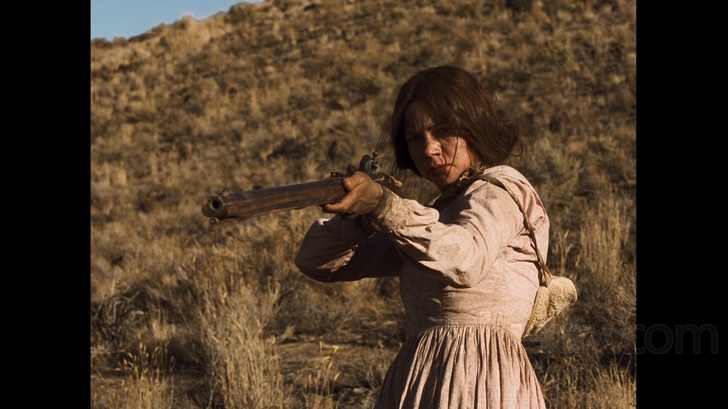
If you've seen and enjoyed Kelly Reichardt's previous films—Old Joy or Wendy and Lucy—then you'll have a head start on understanding and appreciating Meek's Cutoff, a slow-paced survival story that trades the black-and-white simplicity of most westerns for feminism-tinted moral and historical complexity. Understandably, it isn't for everyone, but if you're looking for something more challenging and evocative than your average shoot-em-up, Meek's Cutoff is well worth checking out. It looks fantastic on Blu-ray, and comes in Oscilloscope's beautiful recycled cardboard packaging. Recommended!
Similar titles
Similar titles you might also like

Dead Man
1995

Wendy and Lucy
2008

My Darling Clementine
1946

How the West Was Won
1962

Westward the Women
Warner Archive Collection
1951

Once Upon a Time in the West 4K
C'era una volta il West / Paramount Presents #44
1968

3:10 to Yuma
1957

The Proposition
2005

Paris, Texas
1984

The Homesman
2014

Cimarron
Warner Archive Collection
1931

Wake in Fright
1971

First Cow
2019

The Searchers
1956

McCabe & Mrs. Miller 4K
1971

Duel in the Sun
Roadshow Edition
1946

Ride Lonesome 4K
1959

They Came to Cordura
1959

Comanche Station 4K
1960

The Man Who Shot Liberty Valance 4K
1962